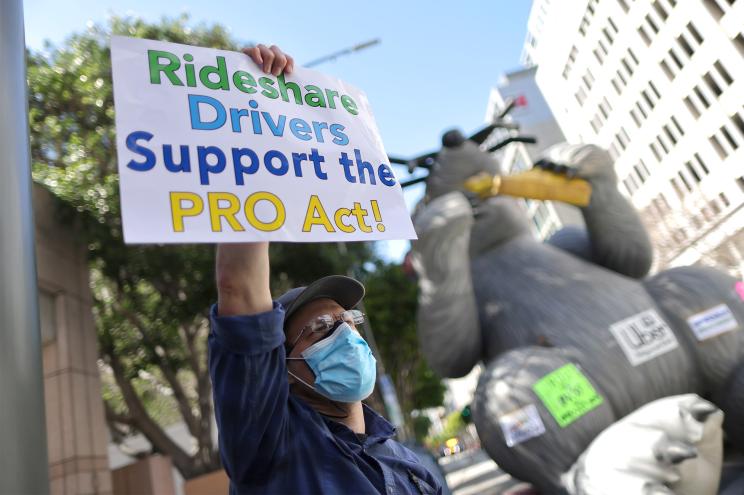Libertarian: Unions’ Gift to Themselves
Big Labor spent millions getting President Biden elected — and now it’s seeking to enact a law “directing federal power and resources to boost flagging” union rolls, laments Reason’s Eric Boehm. The so-called PRO Act “is a grab bag of Big-Labor agenda items that would extend some of California’s awful independent contractor regulations nationwide” and “abolish so-called right-to-work laws in the 27 states that have passed them.” Biden and the unions insist this is about empowering workers, “but if workers were as eager to join unions as [they] seem to think, they wouldn’t need a powerful federal bureaucracy to encourage that outcome.”
Centrist: United Supremes
The most striking aspect of the Supreme Court’s recent rulings on ObamaCare and religious liberty was the “absence of ideological divisions” from a high court that “Democratic leaders have declared hopelessly divided along ideological lines,” observes Jonathan Turley at USA Today. The largely united decisions mark “the final collapse of the false narrative that has been endlessly repeated like a mantra in Congress and the media.” Critics may continue to insist that the court is “dysfunctional, divided and needs to be radically changed,” but the justices aren’t “cooperating,” issuing instead an “inconvenient line of unanimous decisions.” Yet even as the court “seems to be saying a lot in one voice not just about the law, but about its own institution,” the media will undoubtedly continue to denounce it, “because politics demands it.”
Crime beat: A Wake-Up Call in Atlanta
The “mind-numbing randomness, brazenness and, even worse, casualness of violence afflicting Atlanta” has the upscale Buckhead neighborhood “wanting to break away from Atlanta to form its own city” with “its own police force,” writes The Atlanta Journal-Constitution’s Bill Torpy. Atlanta shootings are up 40 percent this year, but police often see “the same ne’er-do-wells walking the streets the next day,” thanks to a “broken” criminal-justice system. “Buckhead is almost three-quarters white,” yet “in black neighborhoods across the city, victims are widespread, and residents there want police to protect them, too.” But Buckhead can get attention, because its departure would “take away 40 percent of the city’s income.” It should be “one loud wake-up call.”
Culture critic: RIP, Janet Malcolm
At First Things, Helen Andrews assesses the complex legacy of veteran New Yorker magazine scribe Janet Malcolm, who died last week — and whose “cold, precise, unsparing” journalistic style recalled that of the great Russian writer Anton Chekhov. She was born to a psychiatrist father, and “psychoanalysis was a constant presence in Malcolm’s journalism.” The shrink’s couch formed her “eye for the telling detail” and “taught Malcolm a certain bleakness” about the world — and her own profession. Yet her “most famous line” — that “every journalist who is not too stupid or full of himself to notice what is going on knows that what he does is morally indefensible” — helped spread cynicism about reporters. The result, Andrews laments, is that now “every trace of authenticity has been scrubbed from press interviews.”
Media watch: Suppressing the Truth
“From the lab-leak theory to the Lafayette Square tear-gassing, anti-Trump bias blinded our news media,” declares Wilfred Reilly at Spiked Online. “Except perhaps for the Hunter Biden story,” there was no “potentially major and obviously newsworthy story more intensely suppressed than the lab-leak explanation for COVID’s origins,” but it was just “revealed quite possibly to be correct.” Pols and press called then-President Donald Trump “reckless” for touting hydroxychloroquine, yet “a major study” has found “it increases survival rates for COVID patients by almost 200 percent.” And the claim “Trump had ‘tear-gassed peaceful protesters’ ” to stage a photo-op turned out to be “complete nonsense.” Tellingly, all these facts only came out when Joe Biden became president. This “mainstream-media swiveling” causes “latent social distrust that has no imaginable upside.”
— Compiled by The Post Editorial Board








